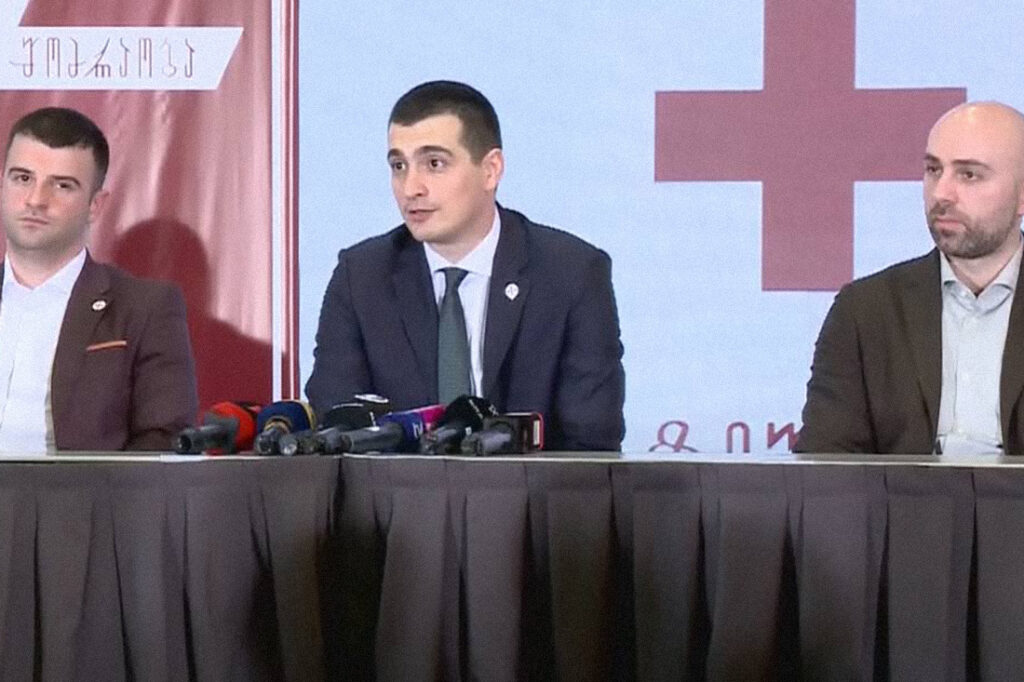The far-right group in Georgia that was largely responsible for organising the anti-Pride riots in July has unveiled a new political party, leading to calls for it to be banned.
On Saturday, Alt Info, which also runs an eponymous TV channel, announced they were establishing the Conservative Movement.
A number of rights groups and opposition parties, as well as the Georgian Public Defender, previously called for the leaders of Alt Info to be criminally prosecuted for organising mass violence against journalists and activists on 5 July.
Among the 53 journalists attacked, camera operator Lekso Lashkarava, who sustained multiple injuries, died several days later in his flat in still-disputed circumstances.
[Read more on OC Media: Homophobic mob celebrates on Tbilisi streets after Pride march cancelled]

The announcement that the group intended to formally enter politics was met with anger from some.
Deputy Public Defender Giorgi Burjanadze and opposition MPs Anna Natsvlishvili and Ana Tsitslidze were among the first to call for the party to be deregistered as soon as they formalised their new political group.
Natsvlishvili, from the Lelo Party, and Tsitlidze, a member of the largest opposition group, the United National Movement, vowed to collect the necessary 30 signatures from MPs to appeal to the Constitutional Court.
Critics have cited Article 23.3 of the Constitution and Article 5 of the Law on Political Unions, which ban political groups propagating ‘violence’ or ‘inciting national, ethnic, religious, or social strife’.
Both the President and the Government also have the power to make similar appeals to the Constitutional Court.
On 22 November, Georgian rights group the Democracy Research Institute joined calls on the National Agency of Public Registry to deny Conservative Georgia registration ‘if the party incorporated unlawful provisions […] in its registration documents’.
An activist group, TV station, now a party
In September, investigative media group ifact.ge identified 36 individuals from Alt Info possibly involved in the July violence, including the chair of their recently launched party, Zurab Makharadze, and Georgian businessperson Konstantine Morgoshia.
Watchdog groups including the International Society for Fair Elections And Democracy (ISFED) have characterised Alt Info as ‘anti-liberal’ and ‘anti-western’.
At the Conservative Movement launch event on 20 November, Makharadze advocated for Georgia to become a ‘partner’ and ‘ally’ of Russia.
‘The fate of Georgia’s territorial integrity is decided in the Kremlin’, Makharadze said during his speech.
‘We are ready […] to talk about integrating Georgia into a security and economic system that is in their [Russia’s] interest but this needs to happen in exchange for restoring [Georgia’s] territorial integrity and improving the economic situation and demography.’
[Read the analysis on OC Media: Georgia’s far right are anti-Russian but share Russian narratives]
After facing clampdowns on Facebook since 2019, Alt Info have recently focused on their presence on YouTube and several online messaging platforms. More significantly, Alt Info also managed to launch a cable TV channel in January this year.
[Read more on OC Media: Georgia’s Trump-loving alt-right begin broadcasting on TV]
In addition to widespread homophobia, the TV channel Alt Info has actively spread false information about the COVID-19 pandemic and voiced messages against women’s rights, migrants, and in favour of domestic violence against children.
In mid-April, The National Communications Commission granted Alt Info national broadcaster status, obligating all TV providers in the country to provide the channel to subscribers.




 22 November 2021
22 November 2021



